 Three covers for one issue
Three covers for one issue We knew it would be a tight race. State Sen. Virg Bernero was challenging Lansing Mayor Tony Benavides, who by dint of being president of the City Council had been anointed mayor after David Holister quit to go to work for Gov. Jennifer Granholm. We figured we better prepare two covers, each declaring one or the other the winner.
We didn’t know how close it was going to be.
Sometime after midnight on Nov. 5, 2003, I called Dennis Preston, who had created the
alternate covers, and let him know the news: We will still did not know who was going to win. Fortunately, Preston was a night Owl and, more fortunately, one of the nicest guys in the world. “Dennis,” I pleaded, “could you whip up a new cover?” or words to that effect. “One that doesn’t declare a winner, because it’s a cliff hanger.”
A couple of hours later, he sent it over. By the time we sent it to the printer, Benavides won by a hair — 258 votes out of more than 23,000.
— BERL SCHWARTZ
Lansing Mayor Virg Bernero sat down with City Pulse editor and publisher Berl Schwartz for over an hour to talk about his three terms in City Hall. He chose not to seek a fourth term and leaves office on Jan. 1 after 12 years The full interview will air on the Lansing public access channel beginning today. It it also available at www.lansingcitypulse.com. The following excerpts are edited and condensed for clarity and concision.
‘What did I do’
I remember sitting in my chair about 6:30 on Friday the first week, looking out of the Capitol longingly thinking, “What in the world? What was I thinking? Leaving the Legislature, I was not term limited. I could have stayed. I thought, “Dear Lord, what did I do? What did I get myself into?” I was exhausted in every way. Physically, mentally, I mean, that first week just took everything I had just to get through it. I remember saying a little prayer. I said, “Dear Lord. Just get me through this year.” All thoughts of a political future were vanquished from my mind.
One tough, great job
Mayor is the toughest job next to president of the United States. You are on the front line. It is like drinking out of a fire hose every day. I have loved it, as you know. I did it with vigor on most days. I’ve loved it.
Wearing this badge of the city of Lansing every day for 12 years has been my highest honor, an extreme privilege, something that I don’t take lightly. This means something to me. It’s the hopes, and dreams, and aspirations of the people of Lansing.
‘My mentor,’ the zing and the void
Bernero ran unsuccessfully against Tony Benavides in 2003 after Hollister left to work for Gov. Jennifer Granholm with three years left in his third term, My mentor, whether he knew it or not at the time, and whether I knew it, was Dave Hollister. I was a political science major. I aspired to go to Washington. I never thought about being mayor. Dave Hollister changed all that for me. When I got to Lansing, Terry McKane was mayor. It was a sleepy town. It was a two-horse town, GM and the state capital and not much more. We didn’t aspire to more. I remember a bench on South Cedar with the slogan of Lansing on it then: “Put the zing back in Lansing.” We just didn’t have a plan. There was no vision.
I was just beginning by running for county commissioner and Hollister ran for mayor. We did a little house party for him. I saw how he galvanized, how he brought people together, how he talked about Lansing as a region. He led with his chin on some things. Some of the stuff people thought was crazy. He was gonna save GM. he was gonna build a stadium where people said it couldn’t fit. When he said he was going to make Lansing a world-class city, people chortled. I might have been one of them. Lansing? Put the zing back in. He built the foundation, and I learned from him.
We had a void, a malaise, for three years. That’s what led me to say, “Maybe I gotta run.”
‘The worst day’
I was the first mayor to lay off a police officer and a firefighter. I don’t say it as a point of pride. That was the worst day of my life. Well, close. When a toddler was killed on the south side who was used almost as a human shield by his father or stepfather, that was probably the worst day. But laying off a police officer or firefighter, that’s the last thing any mayor wants to do, next to attending a funeral of a toddler.
It was the Great Recession. I had to cut 30 percent of staff. Police and fire is over 50 percent of the budget. You’re not going to be able to hold them harmless. The firefighter union worked with us, so only had to lay off 11 firefighters. People say to me, “You must hate the police, because you laid off 36 police, but only 11 firefighters.” No. They took cuts to save their brethren. The police union said, “Cut ‘em loose.” Terrible. Terrible time.
We were actually able to rehire almost every firefighter and police officer. That was very gratifying.
The Angriest Mayor
I led Lansing through the Great Recession. Things were collapsing around us. President George Bush was weighing whether to intervene in a major way to save the auto industry. My dad’s a GM retiree. When my dad came here from Italy, he was a produce man and then went to work for GM. That was when we got health benefits and stopped bringing produce to the doctor’s office because we had the Blue Cross card.
The right wing was talking about, “Let the auto industry die.” That’s when I became the angry mayor because I knew what it meant. I knew how families and the middle class were under attack. GM and Chrysler would have gone down. I was petrified. My city is a GM town. I couldn’t imagine those two plants closing, and the reverberating effects. We’re not just talking about 5,000 or 6,000 employees at those two plants. We’re talking about all of the spin off, the supply chain, the truckers, the steel, the tires, all the things that go into a car. I called the executive director, Tom Cochran, of the U.S. Conference of Mayors. It took me days to get through. At one point, I said, “Call him every half hour. This is a crisis.” Finally we got him on the phone. He pretended he knew me. I said, “Listen, we gotta act. We need to get automotive mayors together. Is there a plan? Do you have a plan? Are you working to get automotive mayors together so we can discuss going in there and lobbying the Bush administration? Blah, blah, blah.”
There was a long pause when I asked the question. He says, “Well, I talked to Manny” Diaz, the mayor of Miami president of the U.S. Conference. “I talked to Manny, and it’s just not a priority for the U.S. Conference of Mayors.”
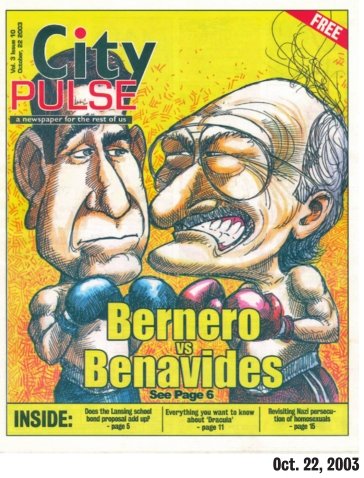
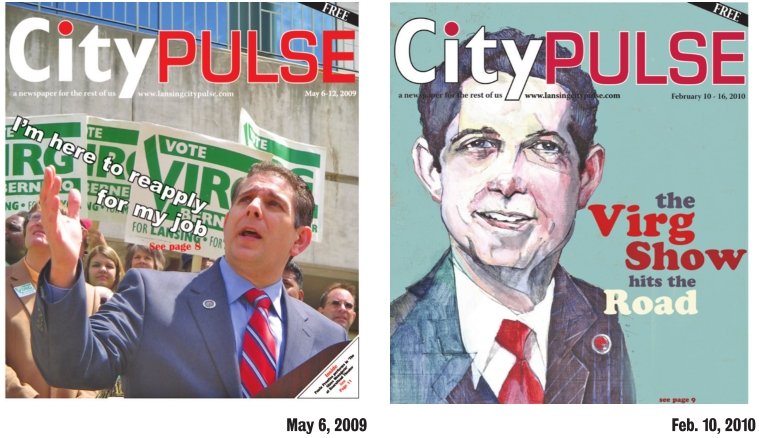
I sat in stunned silence. Literally, it was like I was shellshocked. And then I just hung up the phone. I had the presence of mind, because you would have heard the angry mayor if I would have stayed on the phone. I was either going to either blow up or hang up. I didn’t even slam it. I just hung it up. So I had plausible deniability. Like, maybe we were disconnected. But, I then called in my staff, Randy, and Renee and Joe. I said, “We’re on our own. We’ve got to organize mayors. Google. Get on the Internet. Find every automotive mayor. Try to find where they have a plant or a supplier.”
I just started getting positive responses. These mayors were as scared as I was.
But nobody really knew what to do, not that I did, except that we gotta go to Washington and fight like hell. I called up the one guy I knew in Washington, Matt Ward, who’s a phenomenal lobbyist. ”Matt, I got no money, but I’m gonna have a bunch of mayors. I need your help.”
And the rest is history. He organized us.
We knocked on doors. We had Democrat and Republican mayors from all over the country. We got into Republican doors in Washington because we had Republican mayors.
That was when I got on national news.
I was just Joe Average mayor. I apparently struck a cord, and I guess I came across sincere. I am. I was sincere. I guess I was authentic. I was angry. It wasn’t made up. Because I was angry for my dad, and again, all the things that we’ve talked about. The fact that they could just flush all that, and the way they were blaming the UAW.
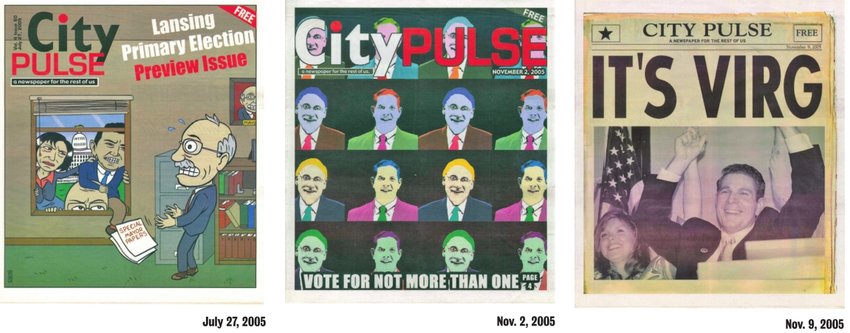
Wrong about City Hall
Out of the four developers that we had submit plans, we chose the non-local developer.
All my friends are equally mad at me. I don’t know this guy, Beitler, from Adam, but we looked into his record. The review committees chose Beitler’s proposal unanimously. I could have overruled them.I wrote a column in your paper saying, “The building is crap. Take it down.
I’ve been in it for 12 years. Everything’s broken about it.” And I believed that. It just goes to show you how wrong we can be. That’s why it is important for leaders to stay open. I’ve tried to do that. As much as people think I’m closed-minded and I’ve made up my mind, I’ve always surrounded myself not just with yes people. Randy Hannan is an example. We argue. We have knock-down, dragout fights all the time. If I wanted a yes person, I wouldn’t have Randy Hannan. My whole staff knows that. Our cabinet meetings, we argue about stuff. They change my mind. People can change my mind. But then, there are cases when I think I’m right, like on Ormond Park or on the Northrup sidewalk. The fact that you, as a resident, don’t want a sidewalk is, frankly, neither here nor there. My job is to build sidewalks. Our job is to figure out what the right thing is, and do it.
Lark
In 12 years, you, and other media want to talk to me about two dismissals — about two departures I should say. You want to talk to me in 12 years about two people that got quote unquote, “Paid off to leave.” I got an answer for you. A two-word answer. Maybe it’s four: “Give me a break.” It was gonna be, “Big deal.”
I’m not gonna get into it. I’m the CEO of a $200 million corporation. Andy Schor will be CEO of a $200 million corporation. He can talk about transparency all he wants. If you think that Andy Schor or any other mayor is going to sit here and tell you every employment decision, and the where-ofs, and where-ats, and whys, you’re kidding yourself. No CEO can. It is complex. There are a lot of moving parts. Keep kidding yourself.
McIntyre

Schwartz: In the Jeanine Mcintyre case, that there were allegations of sexual harassment. Can you rule that out?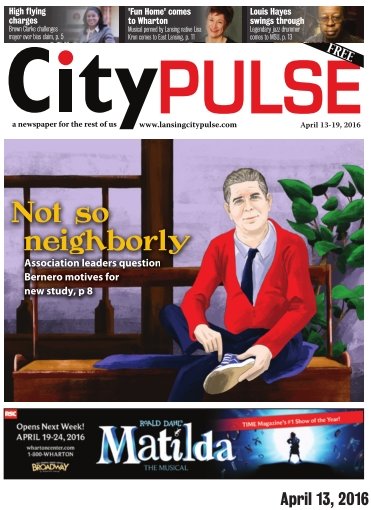
Bernero: I can tell you, there weren’t against me. I can tell you that.
Schwartz: When you say, not against you, it sounds like there were allegations.
Bernero: I don’t believe there were at all. I don’t believe there were at all.
Schwartz: There were not allegations?
Bernero: All I’m saying is, I’m not at liberty to say, because as you’re aware, there was a non-disclosure.
Schwartz: No, you’re not at liberty to disparage anyone.
Bernero: I don’t believe that was anywhere in there. I don’t believe there was any sexual an it was $160,000. She was paid a year’s salary out of a $200 million budget.
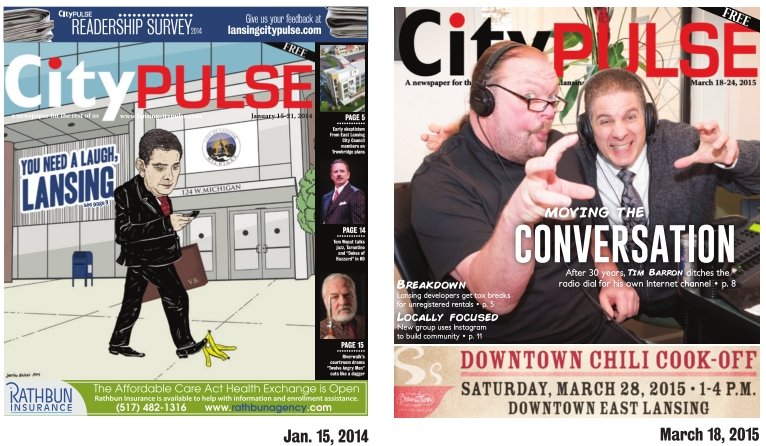
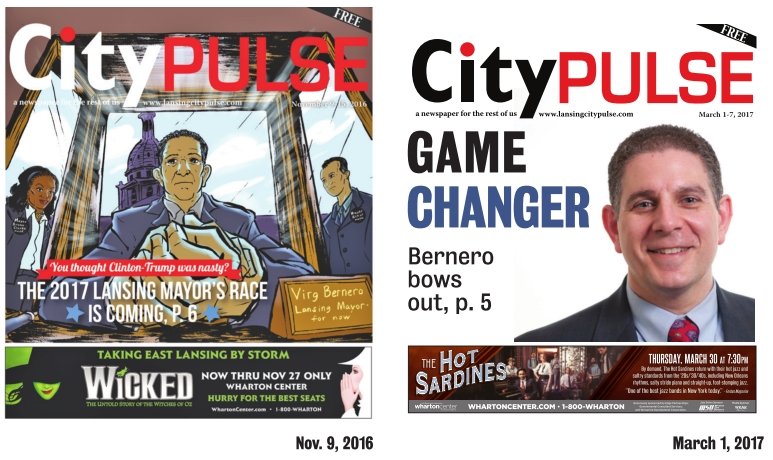
Good to not yet great
A lot of people have stopped me and thanked me. They feel that Lansing is really moving in the right direction. I’m not giving myself an Akknd or even an A- in terms of the state of the city on the way out. I think we’re a solid Bkknd, especially relatively speaking compared to other cities our size with our challenges. we’ve moved the needle. I think we moved from good to a hell of a lot better. Does Virg Benero think we’re great? No. I don’t. I measure it by how people feel, how residents feel. Granted, there’s not unanimity.

The only unanimity is that of the grave, as was said. But I think most people feel that the city is going in the right direction.
Which is why I think I would have been reelected.
ything. But, what I’m telling you is, people can believe, and people can sue. The reason why I think I would have been reelected, by the way, even with this,
Support City Pulse - Donate Today!
Comments
No comments on this item Please log in to comment by clicking here